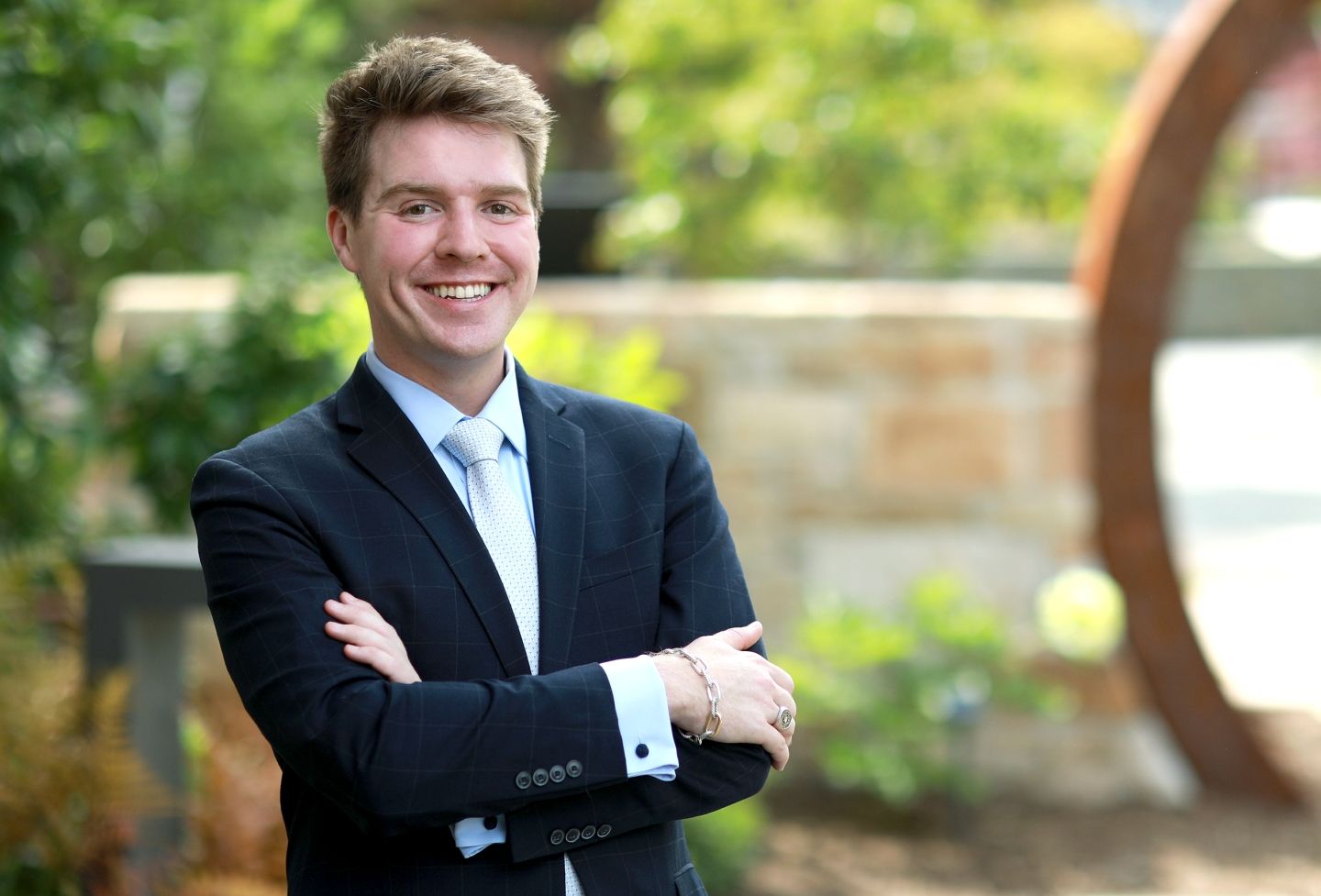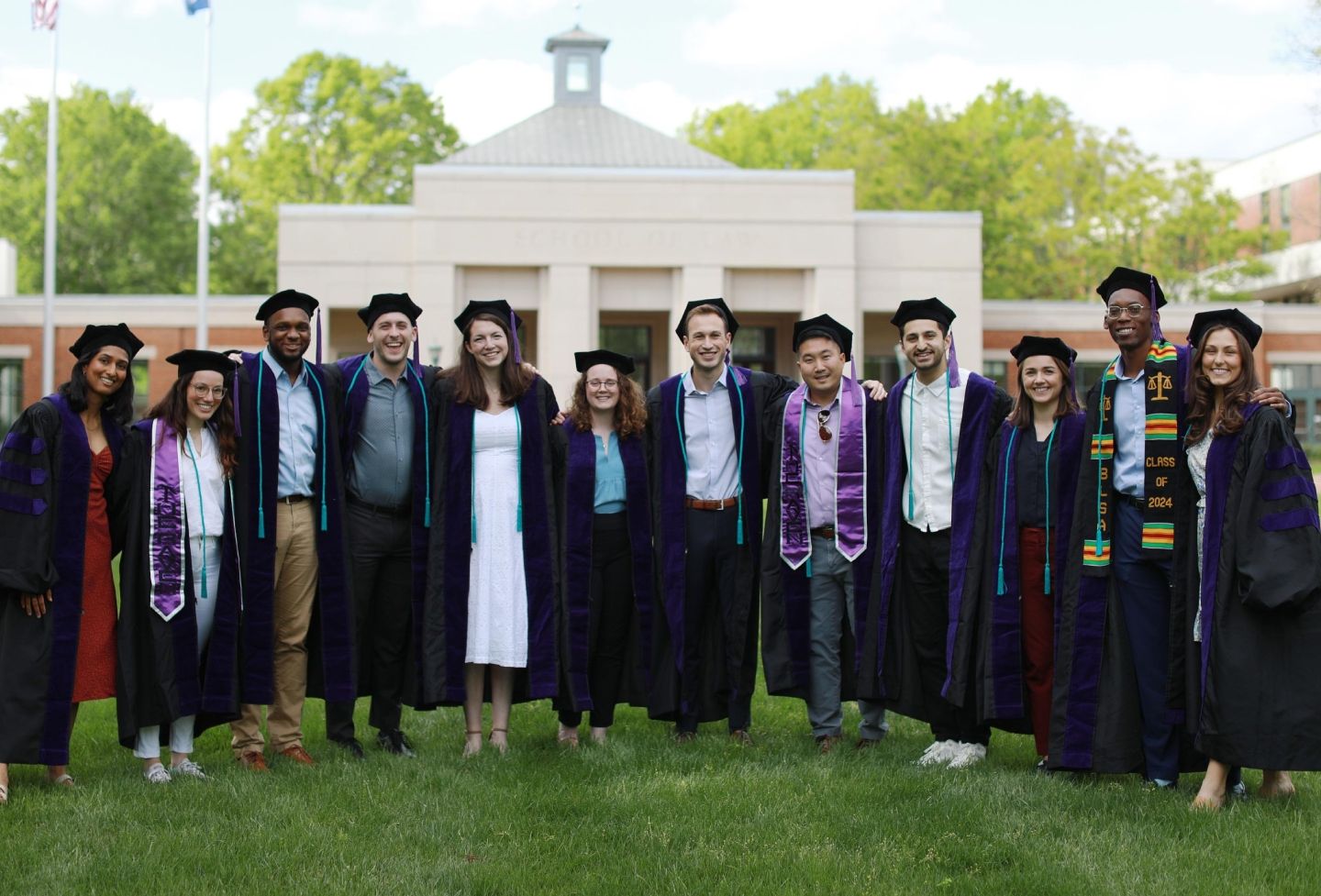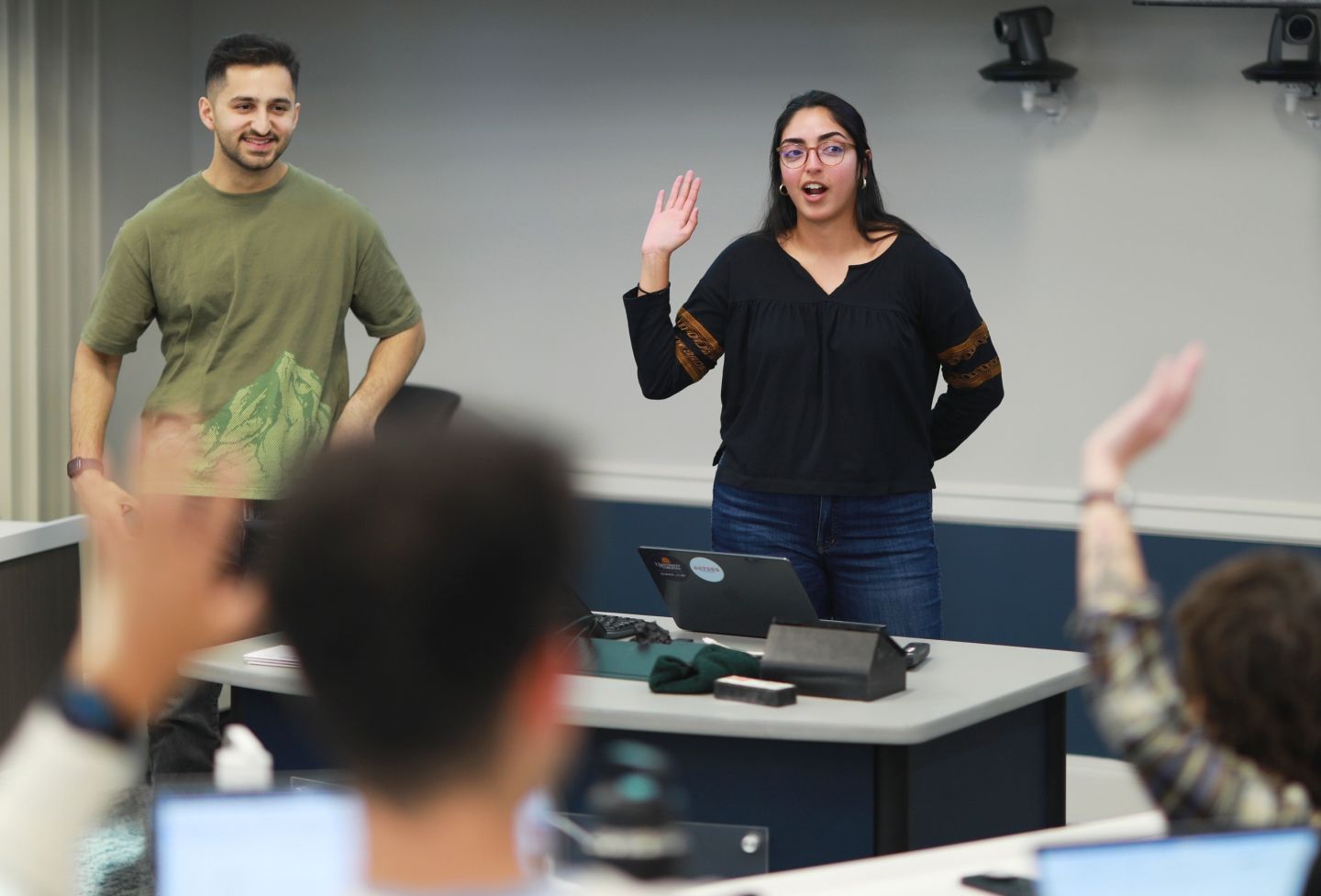With help from two University of Virginia School of Law clinic students and a lawmaking alumna, legislation designed to keep foster children with their families and in their schools was recently signed into law.
Second-years Ryan Carp and Divya Sharma from the State and Local Government Policy Clinic worked with Del. Katrina Callsen ’14 on three bills: HB 27, establishing the Kinship as Foster Care Prevention Program to promote placing children with relatives to avoid foster care; HB 453, expanding eligibility for potential kinship care providers by easing restrictions related to “barrier crimes” that have prevented qualified relatives from caring for children who might otherwise end up with foster parents who were strangers; and HB 777, allowing foster or kinship care children to remain in schools they attended prior to moving into foster care.
Callsen, of Albemarle County, said Virginia’s use of kinship care needed to be updated.
“The bills will make a difference because they provide enhanced services and supports to keep families together and limit disruption to children who might be experiencing abuse or neglect,” she said.
After the bills passed the General Assembly with broad bipartisan support, Gov. Glenn Youngkin signed them in April.
Callsen said Carp and Sharma brought “zealous advocacy and passion” to foster care reform, and noted that the students now have been meeting with the Virginia Department of Social Services to plan how to implement the new laws.
“They met with stakeholders as we crafted the legislation, worked with state administrators to address concerns, lobbied my colleagues to get votes and ultimately testified in front of the General Assembly,” Callsen said.
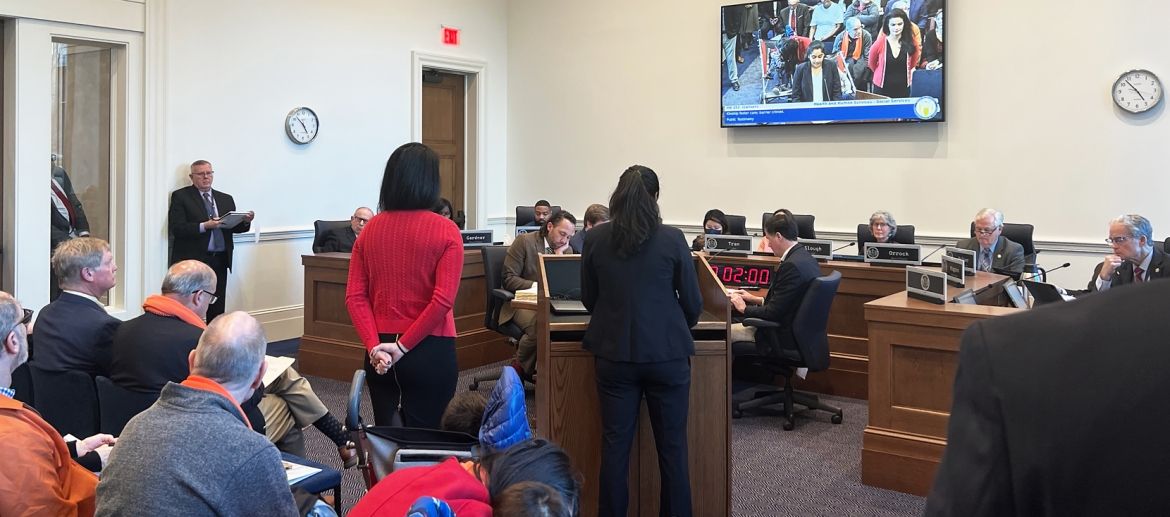
Sharma said she was inspired by the stakeholders, advocates and policymakers who work toward reform every day so they can initiate change during the two-month legislative session. The barrier crimes legislation had failed in the past, she said, but engaging critics early and often helped quell opposition and ease the bill’s passage.
“Being part of the clinic has given me a lot more hope that our government can do positive things for its constituents,” Sharma said. “Obviously, the politics at play can always dampen the success of very necessary bills, but it was refreshing to see how often people rose above their differences to work toward a common goal.”
Carp, who answered questions about the legislation in committee hearings, said the experience strengthened his interest in pursuing a career in law and policy.
“For each of these bills, we had to balance various stakeholder interests, respond quickly to changing circumstances, deal with shifting deadlines and be comfortable with uncertainty,” Carp said. “By focusing on our ultimate goal — creating effective policies that address systemic issues and benefit the people of Virginia — we were able to handle the complexities of crafting and enacting legislation.”
The nonpartisan clinic, directed by Professors Andrew Block and Katie Ryan ’92, and launched by Block in 2020, worked with lawmakers from both parties to secure passage of a clinic record 12 bills this year, and a total of 26 over the past four years.
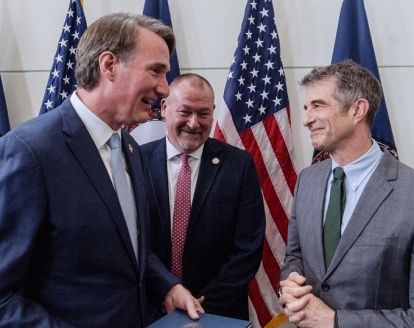
As a UVA Law student, Callsen was part of the Child Advocacy Clinic, which Block led when he was first at the Law School from 2010-14.
“My experience as a clinic student has bolstered my entire career,” she said. “Advocating for the needs of children led me to run for school board and ultimately gave me the experience I needed to successfully navigate in Richmond.”
Ryan said time and staff are in short supply, since the General Assembly is a part-time legislature, so clinic students fill a need for policy research, writing and advocacy.
“I have heard from more than one student that the clinic has been their favorite academic experience in law school and from more than one legislator that the work of clinic students has been critical to the success of their legislation,” she said.
Block said clinic students took on an unprecedented number of legislative clients, which required an immense amount of work, including late nights, early morning drives to Richmond to give testimony and last-minute research to support negotiations.
“It’s also fair to say that the collective impact of their efforts on some of Virginia’s most vulnerable populations — students with disabilities, kids in foster care, people in our behavioral health system and trafficking victims — will be profound,” he added.
Other clinic students helped lawmakers from both parties on additional legislation:
- Gabriel Mahoney ’25 and Chris Seiler ’24 worked with Del. Mike Cherry on legislation outlawing human trafficking and forced labor. Cherry said in committee that Virginia was the only state without such a law. The bill was signed during a ceremony April 3.
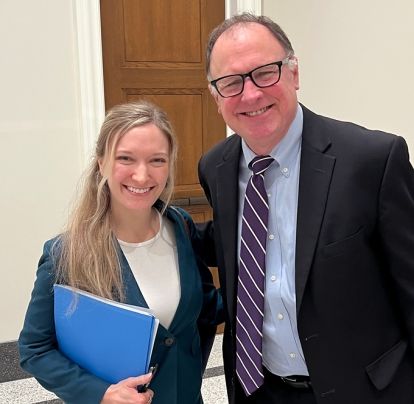
- Mason Davenport ’25 and Allie Hough ’25 worked with Sen. Creigh Deeds on two bills expanding care rendered by Virginia’s new crisis receiving centers and crisis stabilization units. Another directs the Behavioral Health Commission to develop a comprehensive plan to align licensing, training and the civil commitment process with new investments in Virginia’s behavioral health and crisis response services and resources. The bills were signed in April.
- Casey Crowley ’24 and Ella Jenak ’24 helped Del. Carrie Coyner with a bill establishing College and Career Ready Virginia, a statewide program that makes certain dual enrollment courses free for high school students. The bill was signed April 8.
- Peter Grema ’25 and Cyrus Tafti ’25 worked with Coyner on an omnibus bill that provides $4.4 million over the next two years to begin the process of improving the special education system in Virginia. The bill was signed April 4.
- Ethan Young ’24 assisted Sen. Louise Lucas and Coyner with legislation clarifying several provisions of the Virginia Literacy Act, which clinic students helped get passed in 2022. The bills were signed March 8. He also worked with Coyner on a bill establishing a parent data portal for education records.
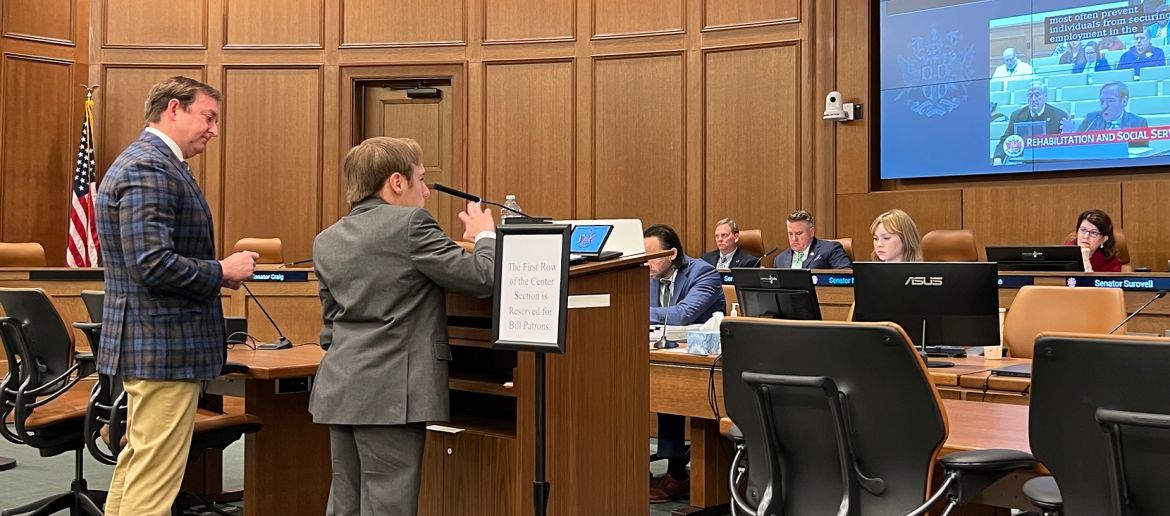
- Carp and Sharma also worked with Sen. Todd Pillion on legislation to expand the pool of eligible applicants for behavioral health positions and peer recovery specialists by easing barrier crime restrictions. The bill was signed April 8.
- Mahoney and Seiler also helped Sen. Scott Surovell ’96 with a bill to establish remedies for denied uninsured or underinsured motorist benefits coverage. Lawmakers approved its passage during the April 16 veto session. The students wrote an op-ed in The Virginian-Pilot about their efforts.
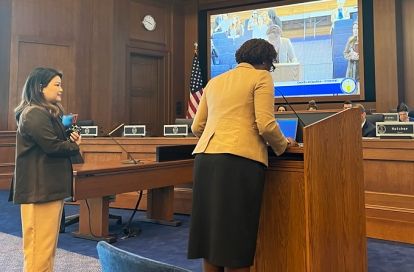
- Davenport and Hough assisted Del. Karrie Delaney on legislation to terminate the residual parental rights of rapists. The bill was carried over to 2025.
- Brigid Harrington ’25 and Shelby Singleton ’25 worked with Sen. Lashrecse Aird and Del. Irene Shin on a bill to eliminate court costs assessed to juveniles or their parents for prosecutions of traffic infractions. The students also worked with Shin on alternative legislation to make these costs discretionary.
- Harrington and Singleton also helped Aird with legislation to study the need for and feasibility of creating a state secretariat of rural affairs. A paper co-authored by clinic student Antonella Nicholas ’23 and Block sparked the proposal. After passing the Senate, the House of Delegates carried the bill over to 2025.
Founded in 1819, the University of Virginia School of Law is the second-oldest continuously operating law school in the nation. Consistently ranked among the top law schools, Virginia is a world-renowned training ground for distinguished lawyers and public servants, instilling in them a commitment to leadership, integrity and community service.
